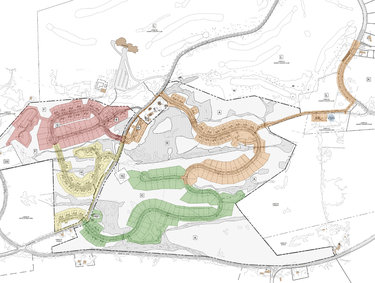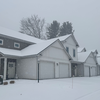New Albany Country Club’s housing proposal reduced again
GUILDERLAND — A long-stalled continuously-contracting project is once again on the town’s agenda.
Before the planning board for a preliminary review on Nov. 12, Albany Country Club is seeking permission to build hundreds of housing units off of Wormer Road.
Now dubbed Reserve — no “The” — at Albany Country Club, the proposal is for a total of 240 units:
— 99 single-family homes;
— 93 townhomes; and
— 48 condominiums.
The club previously presented projects of 254, 290, and over 300 units.
Albany Country Club wants to rezone about 404 of its 800-plus acres from rural agricultural and residential to Country Hamlet, a zoning designation that requires a project to be a minimum of 160 acres of which 60 percent must be preserved as open space and have frontage and access to a county or state highway.
The town board in December 2022 accepted Albany Country Club’s application to rezone the property and allow for what at the time was a 254-unit development. “Accepting is not the same thing as approving,” Supervisor Peter Barber explained in December 2022.
The Country Hamlet review process, Town Planner Kenneth Kovalchik explained at the time, follows Guilderland’s Planned Unit Development review process, meaning the town board is the lead agency and will make the ultimate decision to approve or deny the application. The planning board acts as the site-plan review body for the town, he said.
The project, Kovalchik said, will go back and forth multiple times between the two boards during the review — for sketch plan review, preliminary site-plan approval, and final site-plan approval.
With Nov. 12 acting as only a preliminary review, the board took no action on the application.
Concerns about private roads
On Nov. 12, Albany Country Club presented its preliminary site plan to the planning board, part of which board members know to have a history of issues.
Albany Country Club is proposing to privatize roadways in the area of the development that contains the 48 condo units. This private infrastructure would be owned and maintained by a Homeowner Association (HOA).
“I mean our experience with homeowners associations, quite frankly, is not great,” Chairman Stephen Feeney told project attorney Terresa Bakner. “You can’t make them continue to exist. There’s all kinds of issues with maintenance.”
The HOA would assume full ownership and maintenance responsibility for these roads, including plowing and repaving, the board was told, an arrangement that transfers substantial long-term financial costs from the town to the HOA residents.
While the roads would be private, utilities like water and sewer would be located within designated utility easements under public ownership. But the HOA would be responsible for the condo development’s stormwater facilities, a move that conflicted with Guilderland’s standard operating procedures and raised concern among the board.
There was also concern raised about the inequity created by having what’s effectively the same types of housing located near one another but being served by different infrastructure.
A resident on a public road receives publicly funded right-of-way services, while a neighboring resident on a private road must pay a HOA fee for the exact same services.
This difference could lead to future resident complaints demanding the town assume ownership of the private road. Conversely, with the private roads not planned as a gated community, this means the general public would be able to drive or walk on the roads without contributing to their upkeep.
Feeney said of HOAs “I think they’re ill-equipped to try to maintain stormwater management facilities. I even worry about the roads.” And, while an HOA can handle landscaping, they’re often “ill-equipped” to manage massive, infrequent capital expenses like road repaving, Feeney said, for which an HOA must set aside a “jaw-dropping” amount to cover the cost.
The town has and is facing issues with privately-maintained facilities.
At The Meadows at Mill Hill, Kovalchik said, “We’re already running into issues there. I was just dealing with a resident that’s dealing with a drainage issue, but it’s on HOA land.”
Kovalchik said, “There’s a lot of finger-pointing [over] who should be the responsible party to fix it. [The] issue is magnified across every privately-owned piece of property whether it’s stormwater practice, storm-sewer piping. There’s just issues all over town when it comes to privately owned and maintained [infrastructure].”
Speaking specifically to stormwater, Bakner said Albany Country Club would take Feeney’s observation about its management “under advisement.”



